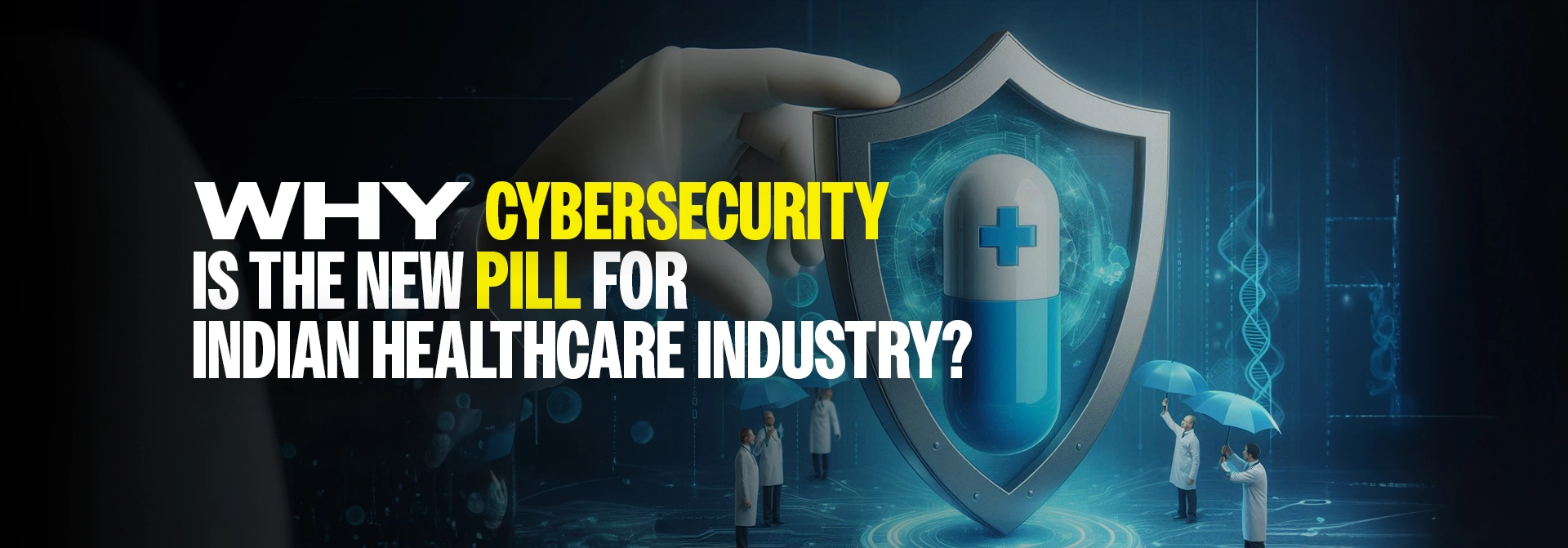Digital transformation has taken the Indian healthcare industry by a storm in the recent years. The technological shifts have resulted in digital patient record management and improved healthcare delivery. But they have also invited some uninvited members, i.e. cyber threats. It’s time to face the facts, cybersecurity isn’t an option anymore for the Indian healthcare industry, it is non-negotiable.
Many new cyber threats in Indian healthcare endanger patients’ data confidentiality and essential healthcare services. Thus, it has become something of an imperative for hospital owners in India to prevent such cyber-attacks to sustain quality healthcare. In this blog, we will examine this growing concern of healthcare cyber-attacks in India, what makes the industry so susceptible and what pills they need to digest to mitigate the risk.
Cyber threats aren’t a growing concern anymore; they are a REALITY!
Indusface in their report on ‘Vulnerabilities of Indian Healthcare Segment’ reveals that the healthcare companies from across the globe faced 9,97,126 cyber–attacks over a one-month period. According to the same report, Indian healthcare organisations experienced 2,78,000 cyberattacks and stands second only to that of the USA. These attacks are not only a threat to the patient’s records but also expensive, destructive to operations, and reputations.
To illustrate, AIIMS, one of the biggest healthcare institutes in India, faced a data breach in November 2023 exposing the patient details of 40 million Indian individuals, including high profile individuals. Other example include the ICMR data breach which exposed the PII (personal identifiable information) of over 81.5cr individuals. These incidents reflect how susceptible healthcare firms are to cyber-attacks. Cyber criminals know that healthcare institutions are a goldmine and they’re relentlessly targeting Indian healthcare firms. It’s time to curb these cyber baddies by implementing cybersecurity in healthcare.
Know Thy Vulnerability Before Enemy Does:
Data is the new currency. A credit card data sells on dark web only for $3 as per CNBC; on the other hand, a medical record for $60. This isn’t a dystopian nightmare but a growing reality. A huge volume of patient data in healthcare institutions are being processed daily. But are there any security measures? Well lack of data security measures in healthcare, makes cyber threats for Indian healthcare so worrisome.
Healthcare facilities in India work with basic infrastructure and limited resources. Since, sometimes the tasks in the healthcare organisation are conflicting, cybersecurity is relegated to the background as the primary tasks of the organisation are considered more important including patient treatment. This lack of investment puts organisations on dangerous ground vulnerable to attack. According to HIMSS survey, healthcare organisations spend only 7% of their budget in cybersecurity which signifies that they need to invest more.
The healthcare industry is also burdened by old core applications that were developed not to sustain modern cyber threats and now are an expensive maintenance nightmare. These systems are often devoid of modern security functionalities and can be hard to patch against well-known threats. These legacy systems can be vulnerable to cyber-attacks and can cause the whole system to downtime once infiltrated.
Comparing healthcare sector employees with other industries, the former are the most vulnerable to cybersecurity threats. This can result in dire consequences for the company such as falling victim to phishing scams, using weak passwords, or leaking sensitive information. Security awareness training is an essential intervention, but it requires many resources.
As hospitals integrate IoT and connected medical devices, the risks are increasing. Some of these devices are procured without vendor assessment and keeping non-secure design in mind, which hackers can exploit to access hospital systems. An assessment of these devices for various protocols such as encryption, data transmission, network isolation, and intrusion detection should be done.
- Lack of Cybersecurity Expertise:
Most modern healthcare facilities face the absence of essential cybersecurity competencies within their organisation. Therefore, they are susceptible to cyberattacks. The process of replenishing existing talent in organisations is challenging every time and increases risks. As per a report, the India has 0.3 million professionals in the year 2023 which is comparatively lower than the global workforce in cybersecurity.
Even after the implementation of Information Technology Act and Personal Data Protection Bill are the current acts in India, the legal protection of healthcare data is not very clear. Since the modern environment is rather turbulent and the number of requirements is rather vast, compliance management is one of the most crucial issues that healthcare companies counter.
What Cybersecurity Pills Need to be Swallowed?
- Build a stronger cybersecurity system:
The first way to establish cybersecurity in healthcare is by enhancing its security framework. Some of the measures it entails include to make sure that all systems, applications, and software are up to date. In addition, all known security patches have been applied. Furthermore, organisations should ensure that their operating systems are up to date. Lastly, efficient security measures against unauthorised persons should be taken using firewalls, IDS and necessary threat monitoring tools.
- Establish a security culture:
It is also necessary to have a security culture in the organisation, with a few rules that must be followed without fail. It entails training employees on measures to minimise risk, and policies and procedures in the organisation’s operations to safeguard all information. Procedures for detecting suspicious activities must also be understood by employees and potential security threats to all systems must be checked frequently.
- Implement data encryption:
Encryption is one of the critical mechanisms to strengthen cybersecurity in healthcare Encryption helps ensure that if hackers gain unauthorised access to data, then it cannot be utilised by them. Encryption procedures should be applied to all forms of sensitive information that a healthcare organisation holds such as patients’ information and other private information.
- Use tools for medical device assessment:
As hospitals may deal with numerous medical device providers for procuring medical technology, they should ensure that all the devices procured are tested through risk assessment tools for data protection. Any lapse from all these vendors can risk healthcare companies’ data. Among the standards to check are ISO 27001, SOC 2, MDR, and IVDR.
Organisations should monitor network traffic to identify potential threats and improve their cybersecurity posture. It includes tracking suspicious activities, such as data exfiltration or malicious code. Network traffic should be monitored regularly to ensure system security. Any anomalies should be reported to the authorities to minimise the damage.
- Implement access controls:
Access control measures can also be used to strengthen cybersecurity in healthcare. Access controls enable organisations to limit employees’ access to specific information or computer resources since they are the only ones who require it. Access to all systems and data in any organisation should be controlled. A check should be done to verify the validity of rights granted periodically.
The Road Ahead
Cyber threats remain a significant issue and causes concern in the Indian healthcare market. The rise in threats not only affects healthcare companies but also on the safety of the patient’s information and vital services. Before implementing cybersecurity measures, healthcare organisations need to conduct a risk assessment to gauge their present security posture. This would help them determine which areas need to be secured based on the risk level.
But, carrying out risk assessments alone would not be enough. You need a cybersecurity consulting firm to help you determine your cybersecurity posture. At PeoplActive, we are all about securing healthcare organisations from cyber threats. Get in touch with us to understand how we can transform your worry into peace of mind.

















